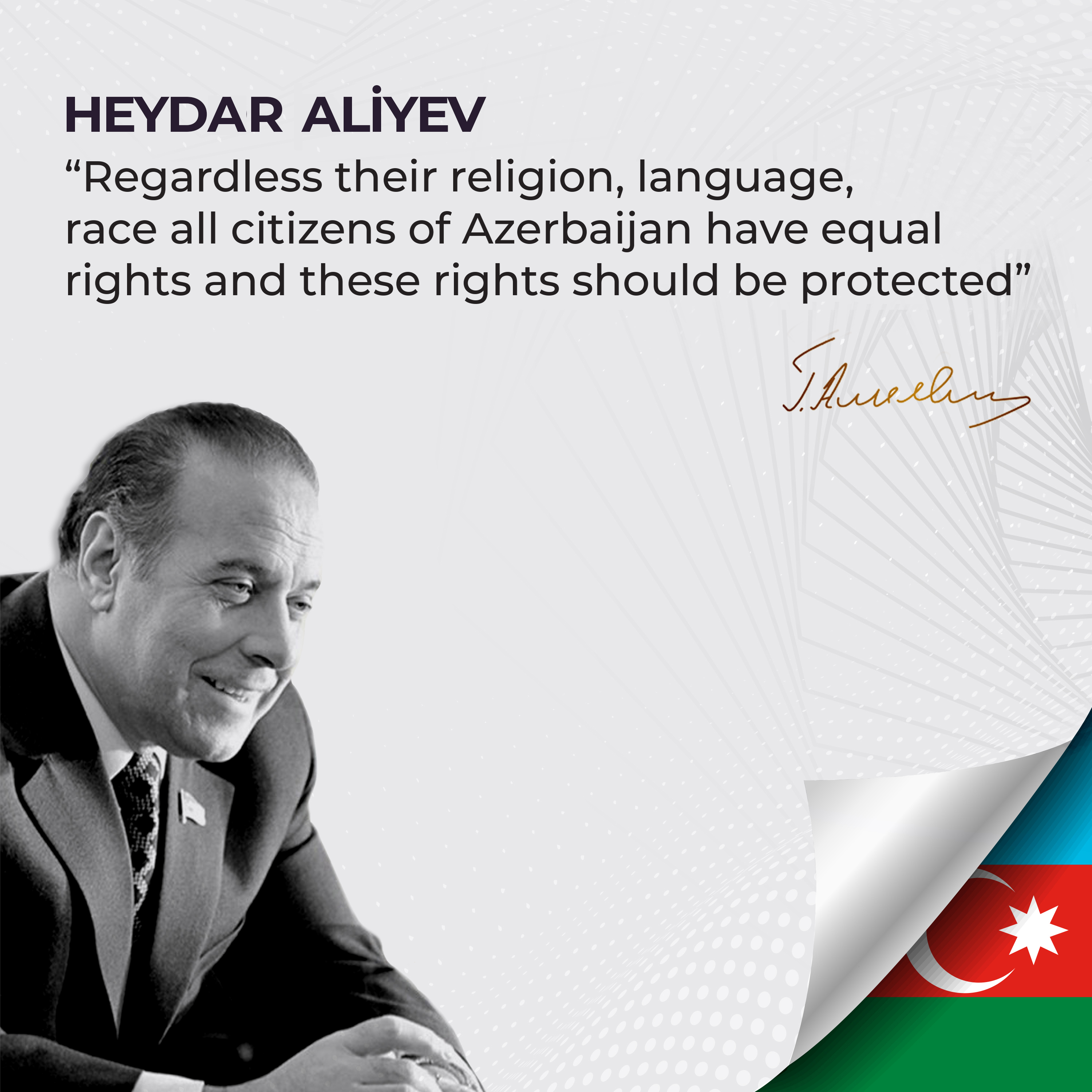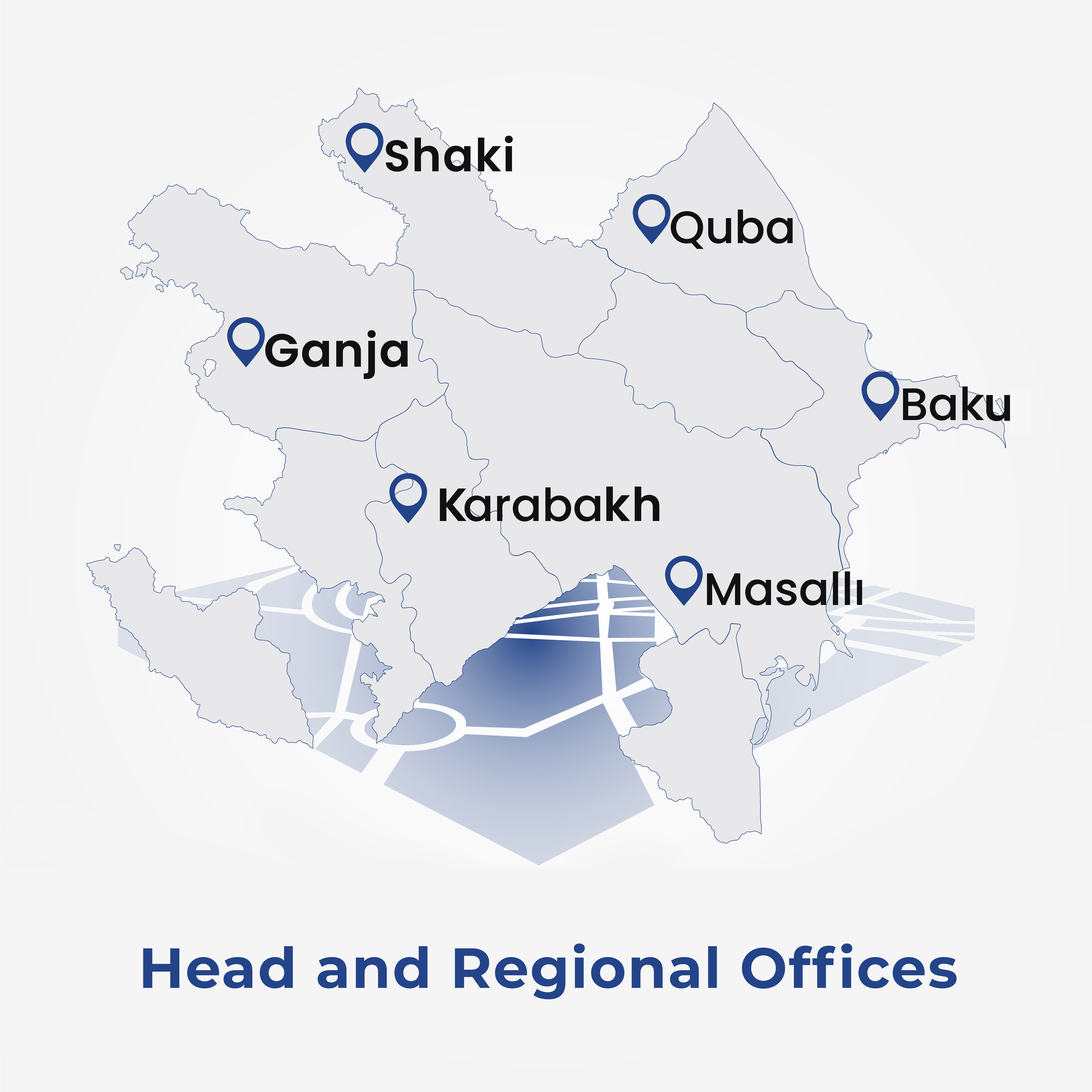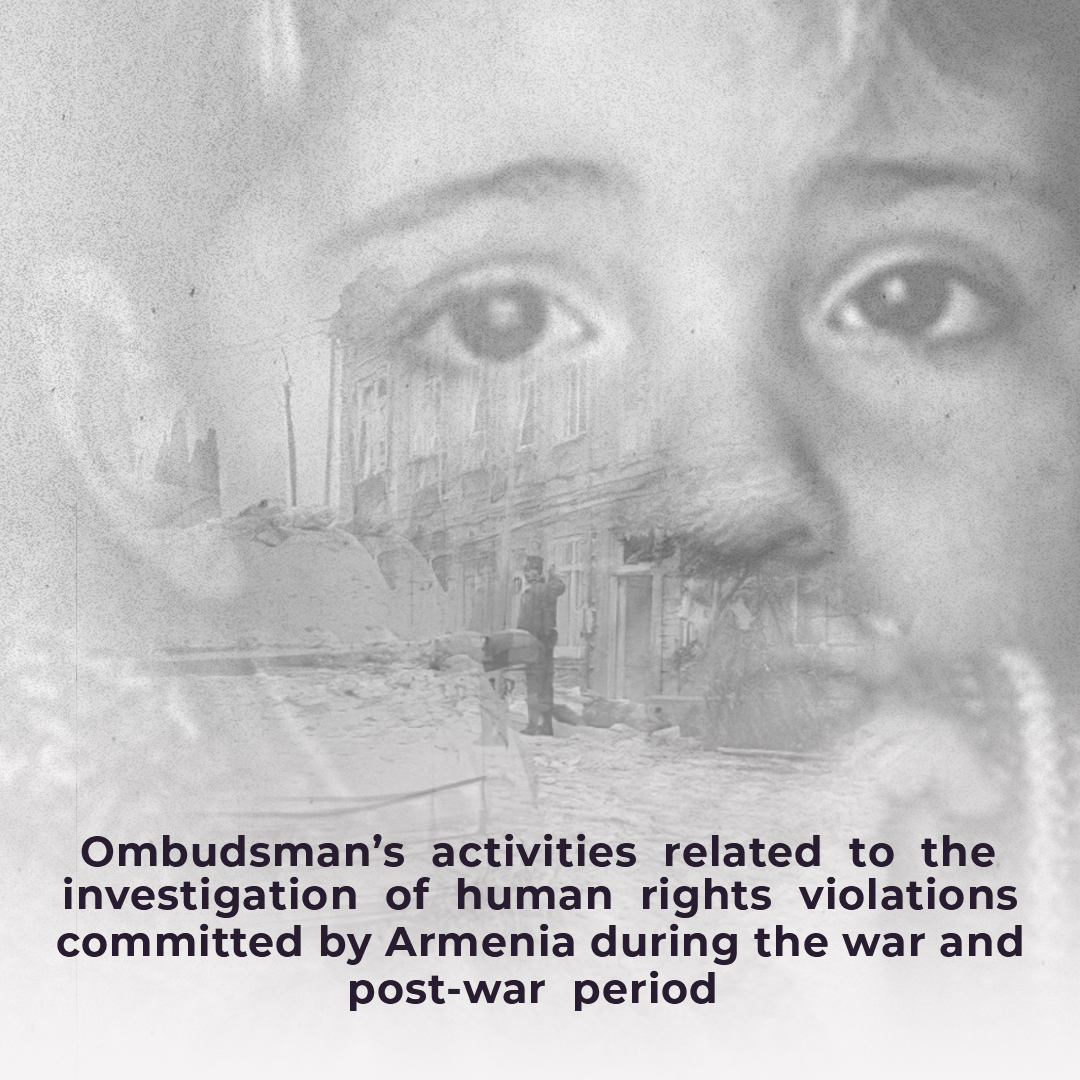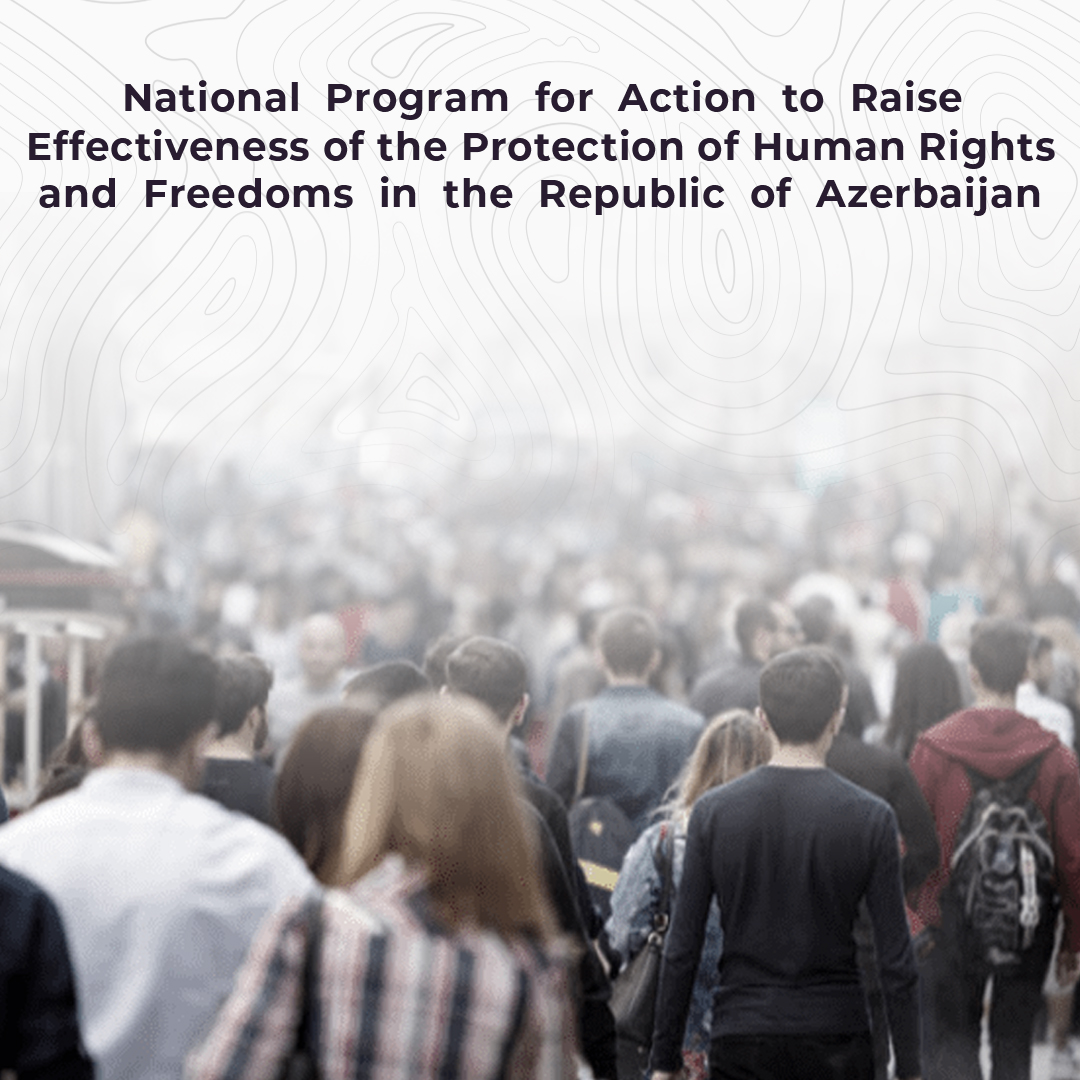
- Home page
- Commissioner
-
Activity Directions
- Mental Health and Human Rights
- Protection of the Rights of Population Groups
- Protection of the Right to Information
- Independent Monitoring Mechanism
- Legal Education
-
International Cooperation
- Cooperation with international organizations
- Cooperation with non-governmental organizations
- Study visits
- Projects
- Statements addressed to the international organizations
- “Ad hoc” reports
- Parallel and alternative reports submitted to the UN Treaty Bodies
- Oral and written statements submitted to the UN Human Rights Council
- Memorandums of cooperation
- Baku Declarations of Ombudspersons
- International Baku Forum
- Scientific Analytical Work
- Cooperation with Public and Civil Society Organizations
- Business and Human Rights
- National Preventive Mechanism Against Torture
- Protection of Human Rights
- Documents
- Media
- Live
- Contact
- Home page
- Commissioner
-
Activity Directions
- Mental Health and Human Rights
- Protection of the Rights of Population Groups
- Protection of the Right to Information
- Independent Monitoring Mechanism
- Legal Education
-
International Cooperation
- Cooperation with international organizations
- Cooperation with non-governmental organizations
- Study visits
- Projects
- Statements addressed to the international organizations
- “Ad hoc” reports
- Parallel and alternative reports submitted to the UN Treaty Bodies
- Oral and written statements submitted to the UN Human Rights Council
- Memorandums of cooperation
- Baku Declarations of Ombudspersons
- International Baku Forum
- Scientific Analytical Work
- Cooperation with Public and Civil Society Organizations
- Business and Human Rights
- National Preventive Mechanism Against Torture
- Protection of Human Rights
- Documents
- Media
- Live
- Contact
Call center
916
STATEMENT of the Commissioner for Human Rights (Ombudsman) of the Republic of Azerbaijan on the 31 March - Day of Genocide of Azerbaijanis
31 March went down in our history as a Day of Genocide of Azerbaijanis, as one of the manifestations of Armenian vandalism committed against whole humanity. During these bloody events had perpetrated in 1918, tens of thousands of peaceful Azerbaijanis had been exterminated due to their ethnic identity being subjected to continuous genocide and the aggression policy of Armenian nationalists. The people had been burned alive in their homes by Armenian-Bolshevik groups, along with murdering with special methods of torture and cruelty.
The genocide of Azerbaijanis had been committed with special brutality in Baku city, the cities and districts included in the governorate of Baku, as well as in Shamakhi, Guba districts, Karabakh, Zangazur, Nakhchivan, Lankaran and in our other various regions; peaceful population had been murdered en masse, the villages had been burned, and our cultural monuments, gravesites, and mosques had been destroyed by cannon fire. During this genocide, which was committed by Armenian nationalists intentionally and with the most brutal ways, 110 villages in Shamakhi district, 167 villages in Guba district, more than 150 in Karabakh, 115 in Zangazur, and 98 villages in Kars province had been destroyed, burned, and in general, more than tens of thousands of peaceful population, including women, children and the elderly had been killed on the ground of ethnicity and religious background. 199 villages had been destroyed in Iravan city, which is an ancestral land of Azerbaijan, and its surroundings and 132 thousand Azerbaijanis had been killed.
After the establishment of the Soviet power in Armenia and Azerbaijan, with the support of this regime, another part of Azerbaijani lands, including Western Zangazur, the mountainous part of Gazakh district and some villages of Nakhchivan, were given to Armenia, as a result of which its territory was expanded many times and increased from 9,000 to 29,000 square kilometers.
The crimes of genocide committed by Armenians were based on a lasting, centuries-old hatred against Azerbaijanis, discriminatory policies and completely unfounded territorial claims.
Despite being subjected to genocides, our people, who are connected to their national and moral values, historical roots, land, and motherland, have preserved their national memory and identity, and as a result of solidarity, our independence has been restored.
After the return to power of National Leader Heydar Aliyev, it became possible to convey to the international community the terrible scale of the genocidal policy and ethnic cleansing that our people suffered throughout history, and at the same time to investigate the crimes committed and give a political and legal assessment of the events that took place.
In 2007, the mass grave accidentally discovered during the construction excavations in Guba city clearly proves the crimes of genocide had committed by the Armenians in 1918. To deliver the crimes of genocide and inhuman acts committed by the Armenian nationalists against a peaceful population to the world community relying on historical facts and to commemorate the memory of victims of genocide, the Guba Genocide Memorial Complex was created in accordance with the relevant Order of the President of the Republic of Azerbaijan, Ilham Aliyev.
Armenia's territorial claims to our country, and its policy of aggression, as well as war crimes committed against our people became more acute at the end of the 20th century, and 20 percent of the areas recognized as the sovereign territory of Azerbaijan at the international level remained under occupation for nearly 30 years. In 2020, those territories were liberated from occupation by our Army, and the territorial integrity of Azerbaijan was restored.
By grossly violating the norms and principles of international law, Armenia repeatedly committed crimes of genocide against the population, and our historical and religious monuments were destroyed, looted and desecrated.
With regret, it should be noted that although there are sufficient proof and evidence about the acts of genocide committed by Armenians against Azerbaijanis, there has not yet been an adequate response to these crimes against peace and humanity at the international level.
I call on the world community and influential international organizations to recognize the crimes of ethnic cleansing and genocide committed by Armenians against Azerbaijanis throughout history as genocide and to support the establishment of justice.
Sabina Aliyeva
The Commissioner for Human Rights
(Ombudsman) of the Republic of Azerbaijan
30 March 2023
The Statement has been submitted to the heads of the UN Secretary-General, UN Security Council, UN Office of High Commissioner for Human Rights, UN Office of High Commissioner for Refugees, UN Human Rights Council, UNICEF, UNESCO, European Union, Council of Europe, OSCE, International and European Ombudsman Institutions, Asian Ombudsman Association, Association of Ombudsmen and National Human Rights Institutions of Turkic States, Organization of Islamic Cooperation and the Ombudsman Association of its member states, Independent Permanent Human Rights Commission of the Organization of Islamic Cooperation, European Network of Ombudspersons for Children, International Peace Bureau, ombudsmen and national human rights institutions of different countries, embassies of the Republic of Azerbaijan in foreign countries and the foreign embassies in Azerbaijan, the Azerbaijani Diasporas, as well as to various religious communities and confessions.
- National preventive mechanism against torture
- Protection of the rights of population groups
- Protection of the rights of refugees, IDPs and migrants
- Protection of the rights of detainees and prisoners
- Protection of the rights of military servants
- Protection of women's rights and provision of gender equality
- Protection of child rights
- General
- Legal awareness
- Protection of the rights of older people
- Protection of the rights of persons with disabilities
- Cooperation with public and civil society
- National preventive mechanism against torture
- International cooperation
- Non-Governmental Organizations
- Public hearings
- Mass media
- Business and Human Rights
- Protection of the rights of martyrs' families and war veterans
- Protection of the rights of migrants
- Prevention of discrimination and ensuring equality
- Right to information
- Mental health
- .
-

- The Ombudsman participated in the International Conference on “Artificial Intelligence and Human Rights: Opportunities, Risks and Visions for a Better Future” in Qatar.
-

- The Ombudsman sent letter to UN High Commissioner for Refugees regarding protection of rights of persons deported from Armenia.
-

- A representative of the Ombudsman Office took part in an event organized by the Ministry of Energy.
-

- The Ombudsman’s representatives participated in the Pardon Decree Enforcement Ceremony.
-

- A series of legal awareness events were organized by the Ombudsman's Regional Centers.
-




